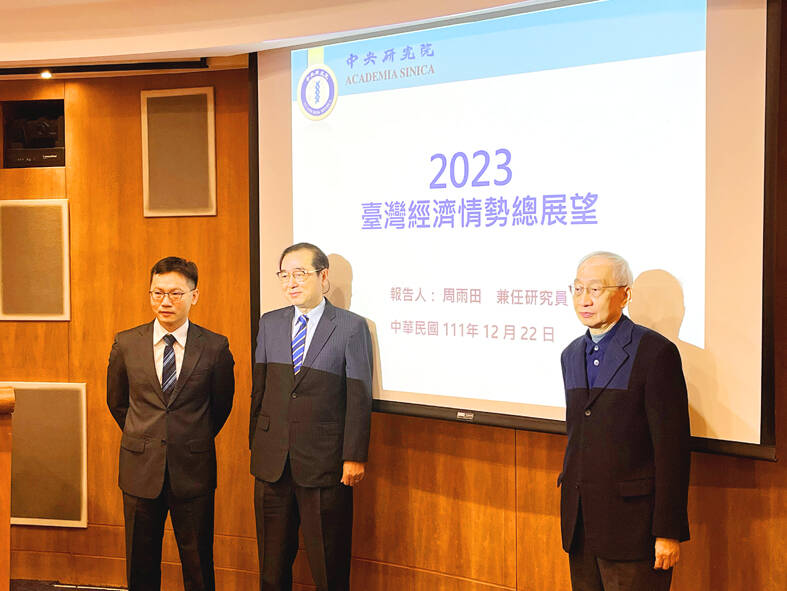Taiwan’s GDP growth could slow to 2.41 percent next year, while inflation might be relatively high at 2.15 percent, meriting further interest rate hikes to curb consumer prices, Academia Sinica yesterday said.
The institute’s growth forecast is the lowest among the nation’s research bodies, while it is the only agency to predict an inflation rate of more than 2 percent — the central bank’s target level.
An ongoing global economic slowdown — induced by inflation, interest rate hikes and geopolitical tensions — would negatively affect Taiwan’s exports and GDP growth, as evidenced by rapidly falling demand for technology products, Academia Sinica research fellow Ray Chou (周雨田) said.

Photo: Hsu Tzu-ling, Taipei Times
Chou said exports of goods and services are expected to grow a mild 2.71 percent next year with the US and Europe heading toward recession, and China grappling with COVID-19 outbreaks.
Imports of goods and services would fare better with a 4.06 percent increase, aided by relatively high international energy and raw material prices, the institute’s semi-annual report showed.
Domestic demand would continue to recover following the reopening of borders in October, as well as more active spending by the government and public enterprises, he said.
Private consumption would rise 4.51 percent, reversing two years of contraction, as people become more comfortable attending gatherings and traveling, despite lingering COVID-19 infections, he added.
The government and public enterprises are expected to lend support by raising their investments by 5.06 percent and 5.29 percent respectively, Academia Sinica said.
Private investment is expected to rise a modest 1.95 percent, as firms reduce or delay capital spending plans to cope with inventory adjustments and poor order visibility, it said.
Consumer prices might prove a challenge and the central bank should press ahead with more interest rate hikes next year, despite a slowdown in price trends, Chou said.
Taiwan’s moderate inflation rate has much to do with government intervention, such as reducing the sales tax on imported energy and raw materials, and freezing the prices of electricity and fuel, he said.
The measures caused Taiwan Power Co (台電) and state-owned refiner CPC Corp, Taiwan (台灣中油) to incur heavy losses, which is not sustainable, Chou said.
Inflation might climb once the government ends the measures, he said.
The core consumer price index, a more reliable long-term price tracker as it excludes volatile items, has been higher than headline consumer prices, affirming his view, Chou said.
Rent has significant weight in household spending, which rose more than 2 percent over the past few months and would continue to climb, as rent hikes usually take place after house price gains, he said.
The central bank can help mitigate inflationary pressures through more active monetary tightening, Chou said, adding that he would favor a rate hike of 0.25 percentage points.

When an apartment comes up for rent in Germany’s big cities, hundreds of prospective tenants often queue down the street to view it, but the acute shortage of affordable housing is getting scant attention ahead of today’s snap general election. “Housing is one of the main problems for people, but nobody talks about it, nobody takes it seriously,” said Andreas Ibel, president of Build Europe, an association representing housing developers. Migration and the sluggish economy top the list of voters’ concerns, but analysts say housing policy fails to break through as returns on investment take time to register, making the

‘SILVER LINING’: Although the news caused TSMC to fall on the local market, an analyst said that as tariffs are not set to go into effect until April, there is still time for negotiations US President Donald Trump on Tuesday said that he would likely impose tariffs on semiconductor, automobile and pharmaceutical imports of about 25 percent, with an announcement coming as soon as April 2 in a move that would represent a dramatic widening of the US leader’s trade war. “I probably will tell you that on April 2, but it’ll be in the neighborhood of 25 percent,” Trump told reporters at his Mar-a-Lago club when asked about his plan for auto tariffs. Asked about similar levies on pharmaceutical drugs and semiconductors, the president said that “it’ll be 25 percent and higher, and it’ll

NOT TO WORRY: Some people are concerned funds might continue moving out of the country, but the central bank said financial account outflows are not unusual in Taiwan Taiwan’s outbound investments hit a new high last year due to investments made by contract chipmaker Taiwan Semiconductor Manufacturing Co (TSMC, 台積電) and other major manufacturers to boost global expansion, the central bank said on Thursday. The net increase in outbound investments last year reached a record US$21.05 billion, while the net increase in outbound investments by Taiwanese residents reached a record US$31.98 billion, central bank data showed. Chen Fei-wen (陳斐紋), deputy director of the central bank’s Department of Economic Research, said the increase was largely due to TSMC’s efforts to expand production in the US and Japan. Investments by Vanguard International

WARNING SHOT: The US president has threatened to impose 25 percent tariffs on all imported vehicles, and similar or higher duties on pharmaceuticals and semiconductors US President Donald Trump on Wednesday suggested that a trade deal with China was “possible” — a key target in the US leader’s tariffs policy. The US in 2020 had already agreed to “a great trade deal with China” and a new deal was “possible,” Trump said. Trump said he expected Chinese President Xi Jinping (習近平) to visit the US, without giving a timeline for his trip. Trump also said that he was talking to China about TikTok, as the US seeks to broker a sale of the popular app owned by Chinese firm ByteDance Ltd (字節跳動). Trump last week said that he had